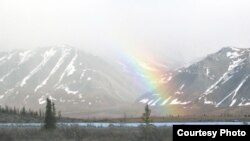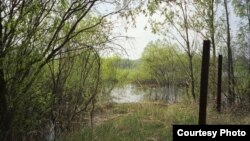Bernie Krause records Mother Nature. During the past 40 years, the musician and naturalist has amassed 4,000 hours of natural soundscapes featuring the voices of 15,000 species, half of which can no longer be heard because of noise pollution and human activity.
Whether it's the driving rain in a tropical storm, the scream of a mountain gorilla or the jolt of a snow mobile engine against the winter silence, Krause has recorded it all.
In his new book, “The Great Animal Orchestra,” Krause takes us on a journey into the world’s wild places to hear this tapestry of sound.
“The insects sing in one niche in a given habitat, birds in another, reptiles, amphibians and mammals all find their own niches to sing so that they stay out of each other’s way,” he says. “It is not so much a single voice as much as it is the collective voices that appear. The ones that amaze me the most are the ones that are mostly in the equatorial regions of the world and the rainforests of the world and the deserts of the world because they are so cohesive and structured.”
In one passage, Krause journeys several kilometers from his camp in the Amazon jungle in Brazil to record the night ambiance.
“I had no sooner set up my mic and sat down at the other end of the cable, 30 feet away [9.1 meters] when I turned on my recorder and heard this jaguar, which had followed us and had stepped right up to the mic and like a great singer, began to growl right in the mic. There it was establishing its own niche and territory, vocally.”
Krause has worked on every continent. His immense sound archive includes such distinct voices as the whistle-like melody of the Musical wren from Peru, and mating gibbons at dawn in Indonesia.
“They sing these wonderful duets that inspire the Dayak to sing in duets as well," he says. "The Dayak are a tribe that lives in Borneo, and the Dayak think of the songs of the gibbons as so beautiful that it causes the sun to rise in response.”
But species like these are threatened by logging, urban development and a changing climate. Krause recorded the impact of this loss near Lincoln Meadow, a pristine landscape in California’s Sierra Nevada Mountains.
“I recorded in 1988 and was told by a logging company there that they were going to do selective logging that summer and that it would have absolutely no impact on the wildlife. I said, 'Fine. Let me record, I would like to see from a recording perspective what is happening.'”
And, when he returned, Krause says the decline was obvious. “And what has happened is that even though they have only taken out a tree here and there, it is remarkable because the soundscape has changed. And even though I have gone back 15 times over the last 15 years, it still has not come back to the original power of its voice.”
While landscapes are vanishing, Krause sees hope in even the most desolate places, like Chernobyl, the site of a nuclear meltdown in Ukraine in 1986. He says a recording made 20 years later shows “what can happen if humans are not around to interfere and it has come back despite all the radiation that is there.”
Krause says his work is a call to protect wild places. “The most important lesson I have ever learned is that this may be our last chance to hear the voice of the divine because that sound to me is the voice of the divine.”
Krause says our impact on the natural world is profound, and unless we pay attention to its creatures, we will silence Mother Nature’s Great Animal Orchestra.
Whether it's the driving rain in a tropical storm, the scream of a mountain gorilla or the jolt of a snow mobile engine against the winter silence, Krause has recorded it all.
In his new book, “The Great Animal Orchestra,” Krause takes us on a journey into the world’s wild places to hear this tapestry of sound.
“The insects sing in one niche in a given habitat, birds in another, reptiles, amphibians and mammals all find their own niches to sing so that they stay out of each other’s way,” he says. “It is not so much a single voice as much as it is the collective voices that appear. The ones that amaze me the most are the ones that are mostly in the equatorial regions of the world and the rainforests of the world and the deserts of the world because they are so cohesive and structured.”
In one passage, Krause journeys several kilometers from his camp in the Amazon jungle in Brazil to record the night ambiance.
“I had no sooner set up my mic and sat down at the other end of the cable, 30 feet away [9.1 meters] when I turned on my recorder and heard this jaguar, which had followed us and had stepped right up to the mic and like a great singer, began to growl right in the mic. There it was establishing its own niche and territory, vocally.”
Krause has worked on every continent. His immense sound archive includes such distinct voices as the whistle-like melody of the Musical wren from Peru, and mating gibbons at dawn in Indonesia.
“They sing these wonderful duets that inspire the Dayak to sing in duets as well," he says. "The Dayak are a tribe that lives in Borneo, and the Dayak think of the songs of the gibbons as so beautiful that it causes the sun to rise in response.”
But species like these are threatened by logging, urban development and a changing climate. Krause recorded the impact of this loss near Lincoln Meadow, a pristine landscape in California’s Sierra Nevada Mountains.
“I recorded in 1988 and was told by a logging company there that they were going to do selective logging that summer and that it would have absolutely no impact on the wildlife. I said, 'Fine. Let me record, I would like to see from a recording perspective what is happening.'”
And, when he returned, Krause says the decline was obvious. “And what has happened is that even though they have only taken out a tree here and there, it is remarkable because the soundscape has changed. And even though I have gone back 15 times over the last 15 years, it still has not come back to the original power of its voice.”
While landscapes are vanishing, Krause sees hope in even the most desolate places, like Chernobyl, the site of a nuclear meltdown in Ukraine in 1986. He says a recording made 20 years later shows “what can happen if humans are not around to interfere and it has come back despite all the radiation that is there.”
Krause says his work is a call to protect wild places. “The most important lesson I have ever learned is that this may be our last chance to hear the voice of the divine because that sound to me is the voice of the divine.”
Krause says our impact on the natural world is profound, and unless we pay attention to its creatures, we will silence Mother Nature’s Great Animal Orchestra.






